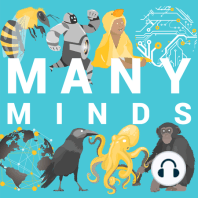65 min listen
Cosmopolitan carnivores
FromMany Minds
ratings:
Length:
62 minutes
Released:
Apr 18, 2024
Format:
Podcast episode
Description
They tend to move under the cover of darkness. As night descends, they come for your gardens and compost piles, for your trashcans and attic spaces. They are raccoons, skunks, and coyotes. And if you live in urban North America, they are a growing presence. Whether you consider them menacing, cute, fascinating, or all of the above, you have to grant that they are quite a clever crew. After all, they've figured how to adapt to human-dominated spaces. But how have they done this? What traits and talents have allowed them to evolve into this brave new niche? And are they still evolving into it? My guest today is Dr. Sarah Benson-Amram. Sarah is Assistant Professor of Forest and Conservation Sciences and Zoology at the University of British Columbia; she also directs the Animal Cognition Lab at UBC. Sarah's research group focuses on the behavioral and cognitive ecology of urban wildlife. They ask what urban wildlife can teach us about animal cognition more generally and try to understand ways to smooth human-wildlife interactions. Here, Sarah and I talk about her work on that trio I mentioned before: raccoons, skunks, and coyotes. These three species are all members of the mammalian order of carniovora, a clade of animals that Sarah has focused on throughout her career and one that has been underrepresented in studies of animal cognition. We discuss the traits that have allowed these species—and certain members of these species—to thrive in dynamic, daunting urban spaces. We also talk about the big picture of the evolution of intelligence—and how urban adapter species might shed light on what is known as the cognitive buffer hypothesis. Along the way, we touch on: the neophilia of raccoons and the neophobia of coyotes, puzzle boxes, the Aesop's fable task, hyenas and elephants, brain size, individual differences, human-wildlife conflict, comparative gastronomy, and the cognitive arms race that might be unfolding in our cities. If you have any feedback for us, we would love to hear from you. Guest suggestions? Topics or formats you'd like to see? Blistering critiques? Effusive compliments? We're open to all of it. You can email us at manymindspodcast at gmail dot com. That's manymindspodcast at gmail. Though, honestly, if it's really an effusive compliment feel free to just post that publicly somewhere. Alright friends, on to my conversation with Sarah Benson-Amram. Enjoy! A transcript of this episode will be available soon. Notes and links 8:50 – A study of manual dexterity in raccoons. 11:30 – A video featuring raccoon chittering, among other vocalizations. 12:00 – A recent academic paper on the categorization of wildlife responses to urbanization—avoider, adapter, exploiter—with some critical discussion. 14:00 – A study of how animals are becoming more nocturnal in response to humans. 18:00 – An encyclopedia article on the Social Intelligence Hypothesis, by one of its originators, Richard Byrne. A recent appraisal of how the hypothesis has fared across different taxa. 18:30 – A recent review article by Dr. Benson-Amram and colleagues surveying carnivore cognition. 25:00 – On the question of urban vs rural animals, see the popular article, ‘Are cities making animals smarter?’ 28:00 – A study by Dr. Benson-Amram and colleagues using puzzle boxes to study behavioral flexibility in captive raccoons. See also her follow-up study, conducted with a large team of neuroscience collaborators, examining the brains of raccoons who successfully solved the puzzle boxes. 34:30 – One of Dr. Benson-Amram’s earlier studies on innovative problem solving in hyenas. 36:30 – Our earlier episode on animal personality with Dr. Kate Laskowski. 39:00 – A study by Dr. Benson-Amram and colleagues exploring raccoons’ ability to solve the Aesop’s Fable task. She has also used this task with elephants. 44:00 – A study by Dr. Benson-Amram and colleagues examining reversal learning in raccoons, skunks, and coyotes. 49:00 – An articl
Released:
Apr 18, 2024
Format:
Podcast episode
Titles in the series (100)
An animal in denial: A conversation with Melanie Challenger by Many Minds
